One day in the life of two young refugees from North Korea
Categories: Nations | One Day | Society
By Pictolic https://pictolic.com/article/one-day-in-the-life-of-two-young-refugees-from-north-korea.htmlKim Kyung-ok still remembers running after balloons, boxes of foreign humanitarian aid filled with South Korean noodles and letters from children like her. At that time, the girl did not yet know that somewhere there is a better life than the one she was used to from birth in North Korea: an existence dictated by a ruined economy and a draconian political system. A few years later, her mother Kim Tae-hee learned a higher standard of living in China when she managed to become one of the 50 or 60 thousand North Koreans who were allowed to work abroad. This opportunity is given only to those citizens who are considered loyal to the regime.
Kieng-ok was only 12 years old when her mother decided to make the dream of a better life a reality and ran away with her youngest daughter to China. Now Kyung-ok is 21 years old, and she told the story of her and her mother's difficult escape from North Korea and resettlement to South Korea to photographer Caitlin O'Hare. She filmed the life of her heroine in Seoul in 2015.
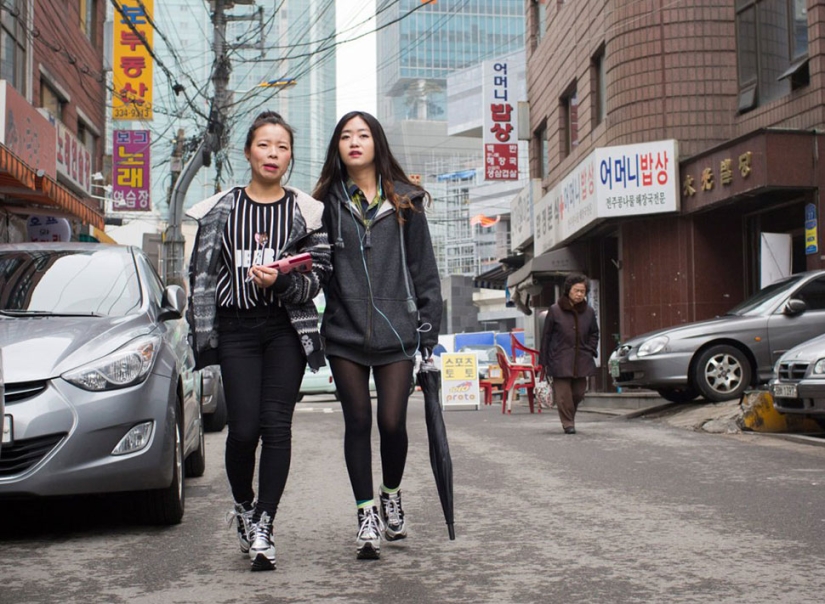 Source: Time
Source: Time
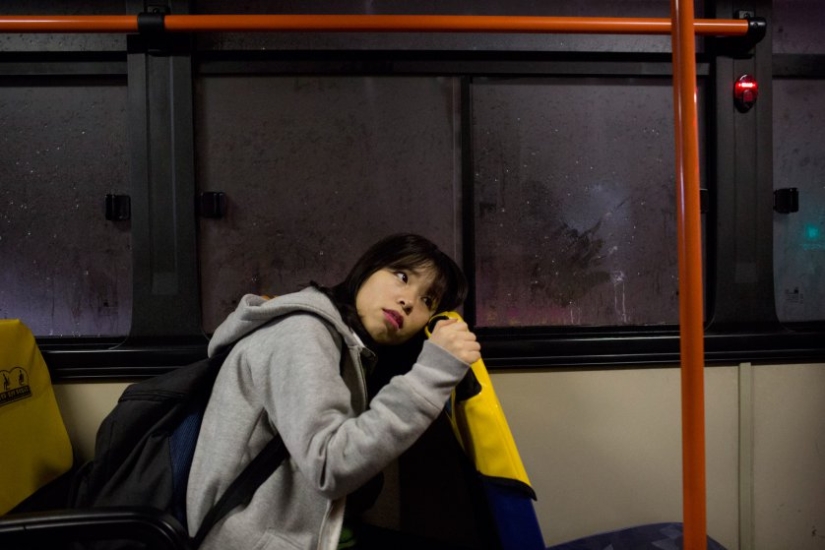
Kyung-ok takes the bus home from school at half past seven in the evening. In South Korea, classes are often held late, and students sometimes study for sixteen hours a day. Too much competition in studies tires Kieng-ok. She does not want to go to university, but instead goes to additional classes in hairdressing and manicure in order to immediately start working in the beauty industry and earn good money.
It was 2007, and Beijing was preparing to host the 2008 Summer Olympics. Before the Olympics, pressure on refugees from North Korea intensified, and China repatriated back all those whom the authorities suspected of trying to escape to South Korea. "There were such inhumane conditions (in China) that Mom decided it was better for us to go to South Korea," Kim Kyung-ok recalls. He and his mother were forced to hide, live in caves, and then move through Vietnam and Cambodia with the help of an intermediary for money. They took refuge in a Christian church in Cambodia and reached South Korea in 2008.
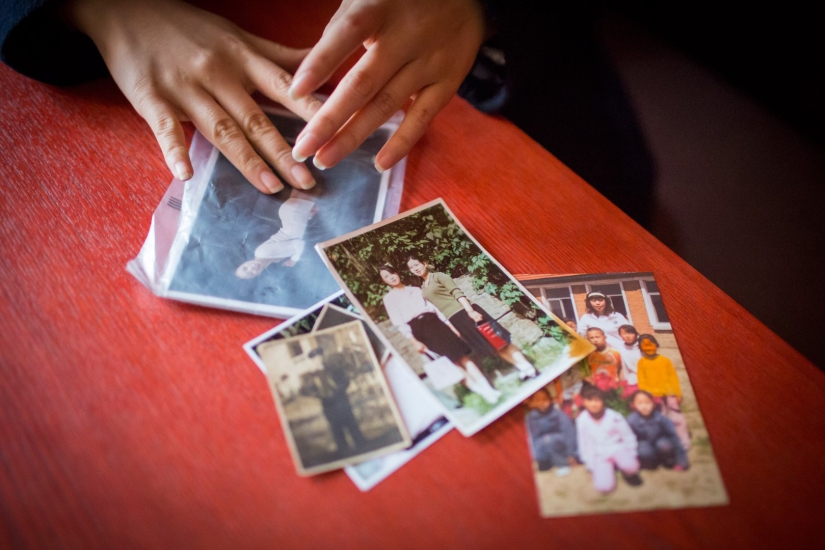
Kyung-ok shows photos from a trip from North Korea to China, Vietnam and Cambodia in a small Seoul cafe. The pictures show two of her three sisters, her grandfather in full uniform of the North Korean army, she herself in the lower grades of a North Korean school. In contrast, she also shows bright pictures taken already in South Korea. These photos, as well as a backpack with food and several items of clothing, are all that he and his mother took with them when they fled. Before they left, one of the older sisters made her a doll out of old clothes, but she couldn't take the doll with her because she needed to leave more room for food.
Kyung-ok is one of approximately 27,000 North Korean refugees living in South Korea. Since Kim Jong-un came to power, border controls have been tightened, but still hundreds of North Koreans continue to risk their lives crossing the border in the hope of escaping widespread poverty and an absurdly cruel political system. 70% of the approximately 30,000 refugees from North Korea who managed to reach South Korea are women.
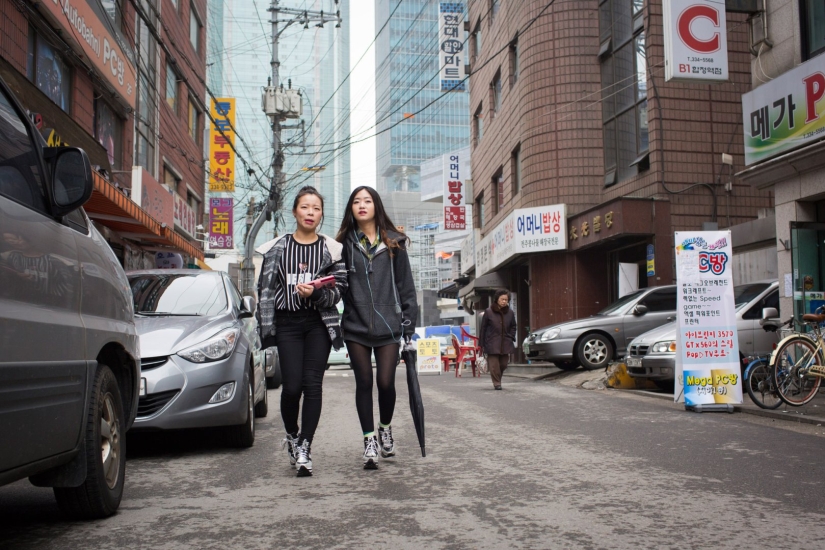
Refugees from North Korea, 19-year-old Kyung-ok (translated as "Moon Age") and 22-year-old Sarah (the English name is used for security reasons) in identical shoes walk down the street hand in hand to a service at a Christian church in Seoul.
The girl adapted well to life in South Korea and became friends with Sarah, the same refugee they met in the resettlement camp. Sarah asked O'Hara not to mention her real name. "Their friendship is special," says the photographer, recalling his relationship with the girls during her seven—month stay in South Korea. — In Korean, seniors are addressed as senior family members. When they started calling me big sister, it was wonderful."
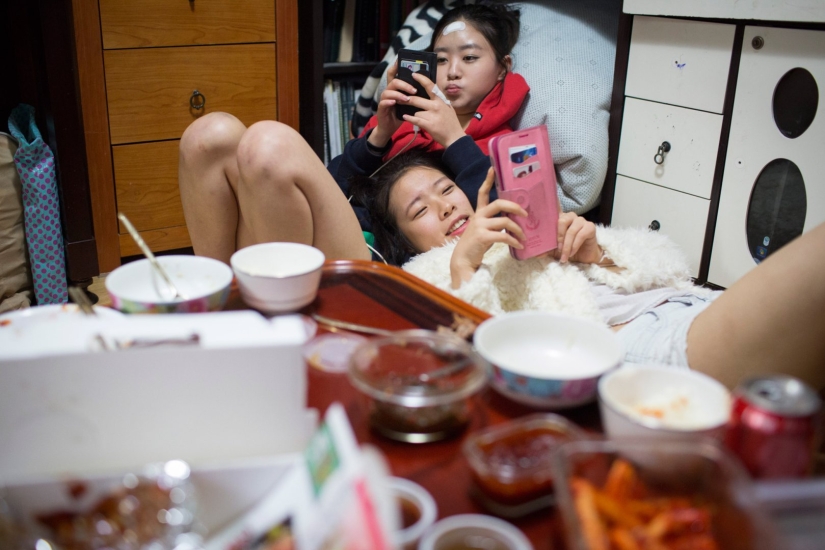
Kieng-ok and Sarah pass the time looking at their phones after having dinner at Kieng-ok's house, taking a takeaway.
Caitlin O'Hara became close to her character: they watched movies together when they stayed over at each other's house, and she talked about her life in the Midwest. "Sometimes we watched Korean movies, sometimes we watched American movies, and it was fun. We shared pieces of our culture," says the photographer. The girls tried to speak to her in English, and she spoke to them in Korean.
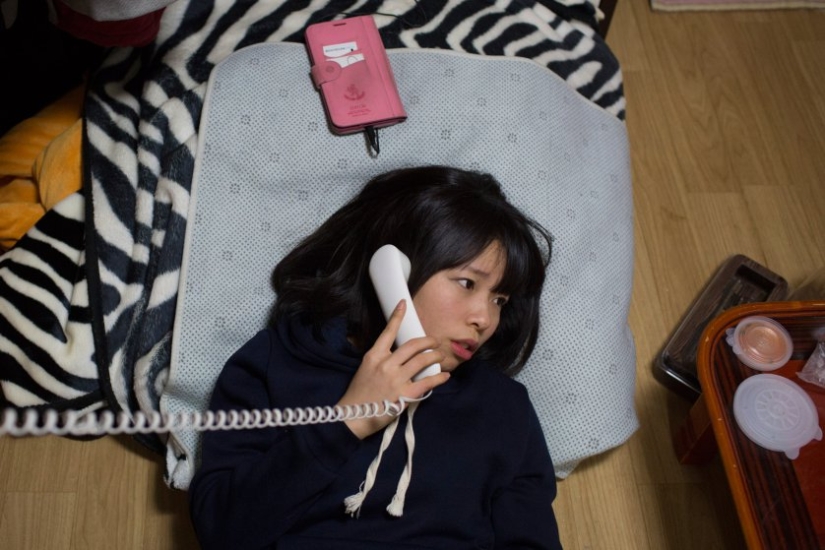
Kyung-ok learns by phone that a close friend, also a refugee from North Korea, is pregnant. Abortions are illegal in South Korea, and single mothers are outcasts of society. This can cause you to lose your job or family support. The friend in question is struggling for her mental health and is going through a difficult period of adaptation to life in South Korea.
Relationships and friendships turned out to be vital for Kyung-ok: she lived alone in Seoul from the age of 13 and studied at school, and her mother, a music teacher, worked in the south of the country. "Sarah and Kyung-ok rely on each other a lot, like many in the refugee community, because they have a lot in common regarding their homeland and what they had to go through in Seoul," says the author of the pictures.
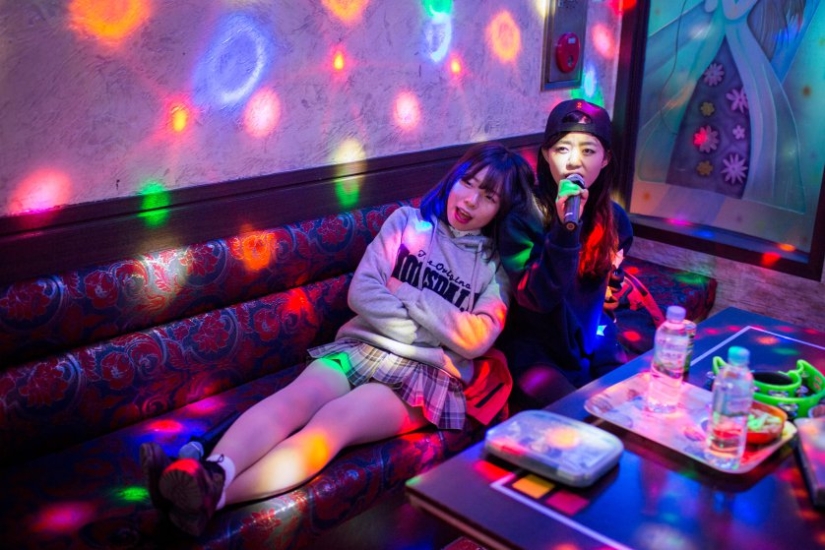
Kyung-ok and Sarah spend time in norebang, a karaoke room. When Kyung-ok first arrived in South Korea, it was difficult for her to make friends with someone. Her classmates treated her with suspicion, asking if she was a communist or a spy. South Koreans believe that North Koreans are quarrelsome, cruel and untrustworthy. In order to find friends faster, Kyung-ok went to local karaoke rooms and chatted there with children like her. Her mother is a music teacher in Changwon, and the girl has a confident, strong singing voice.
Kyung-ok has the same strong relationship with her new boyfriend, a Jamaican-American guy from a foster family who is studying in South Korea. Together they get used to living in a new world for themselves. The girl laughs, saying that for sure she is the first North Korean woman who meets an American. "I am inspired by her courage, she is an amazing person," says O'Hara.
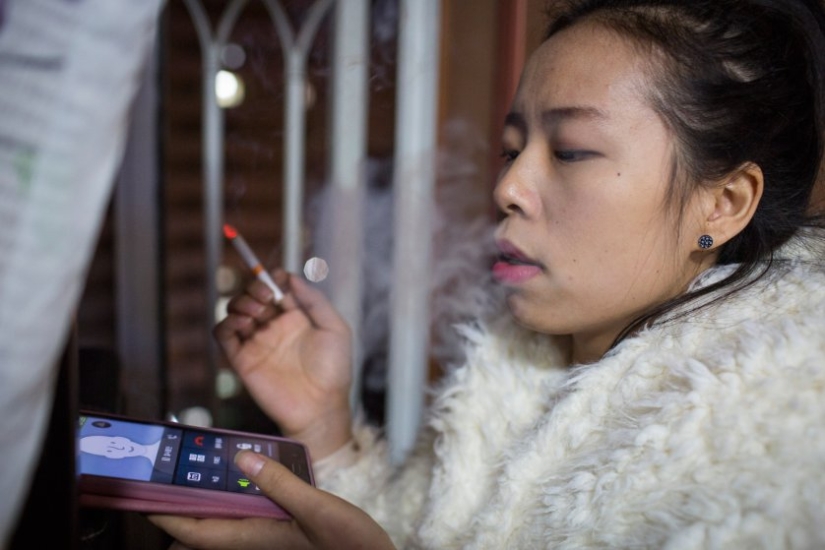
Kyung-ok smokes on his balcony. Now she is in the third grade of high school, and started smoking as soon as she arrived, at the age of 13. Being a refugee and having no friendships, she wanted to join the company of her smoking classmates in the fifth grade. Smoking is common among high school students in South Korea, as they study a lot and experience severe stress due to competition and inflated expectations.
Nevertheless, people like Kieng-ok and Sarah live in a new place cautiously. "There are still agents from North Korea in South Korea who are trying to detect deserters," the photographer says. Many, such as the elder sister Kyung-ok, could not successfully overcome this path. She disappeared in 2004 in China while walking with a girlfriend. Later it turned out that the girlfriend was executed. In 2013, the UN Investigative committee reported punishments that ranged from imprisonment and execution to various forms of torture, including starvation, after China forcibly returned refugees to North Korea.
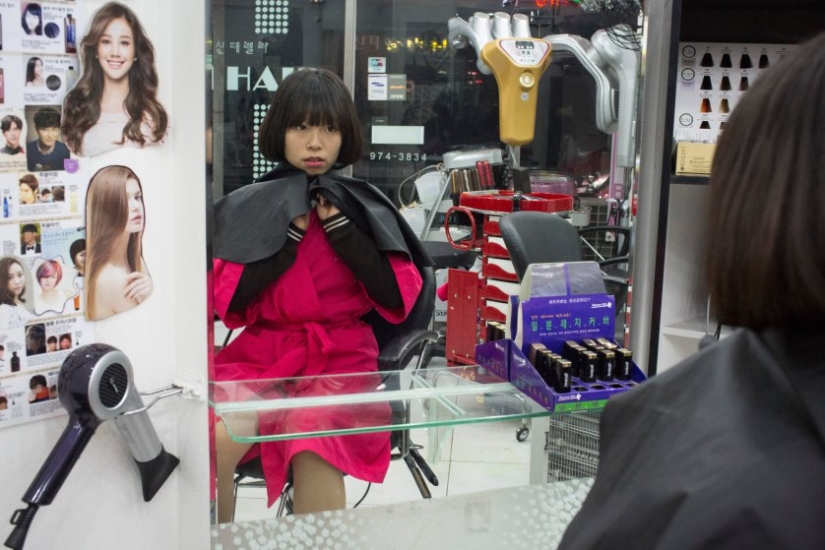
Kyung-ok looks at herself in the mirror — her aunt cut and styled her hair in her beauty salon in Seoul. The girl is studying to become a stylist-hairdresser and a nail service master and helps her aunt as much as possible. In North Korea, there is little room for self-expression in hairstyles: acceptable hairstyles are officially approved. But Seoul quickly turned into the world capital of beauty and style.
Photographer Caitlin O'Hara is one of those who wants to draw attention to the refugees themselves and dispel the misconceptions that all residents of North Korea are either zombified or extremely aggressive people. "This is not the case if we talk about all the wonderful people I met," says the photographer.
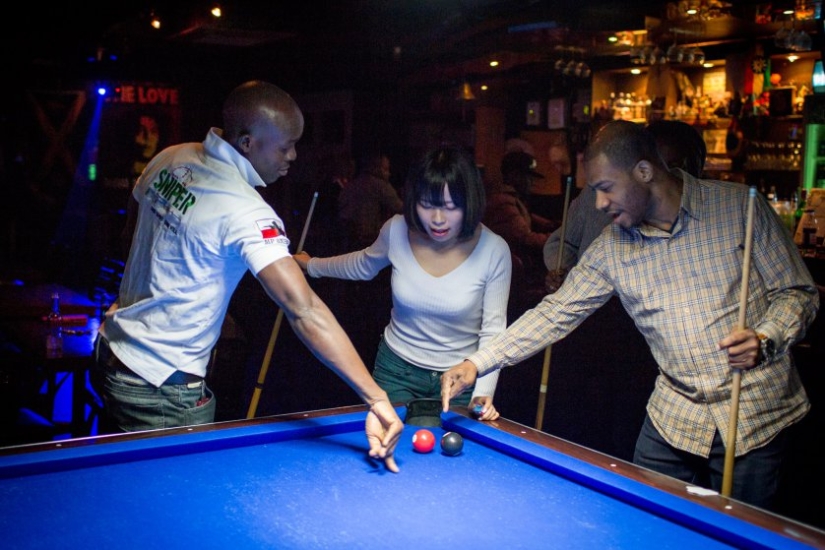
Kyung-ok plays billiards with Christian King from Liberia (left) and Jerry Alexander from Canada at the Jamaican bar Club Zion. As a child, the girl almost never met foreigners, and now she likes to visit Seoul's Itaewon district. There is a US Army garrison here and many foreigners. Kieng-ok likes to meet people from different parts of the world and try foreign food, although it tastes too sweet, salty and not at all spicy. She especially likes spaghetti, Greek gyros and American breakfasts.
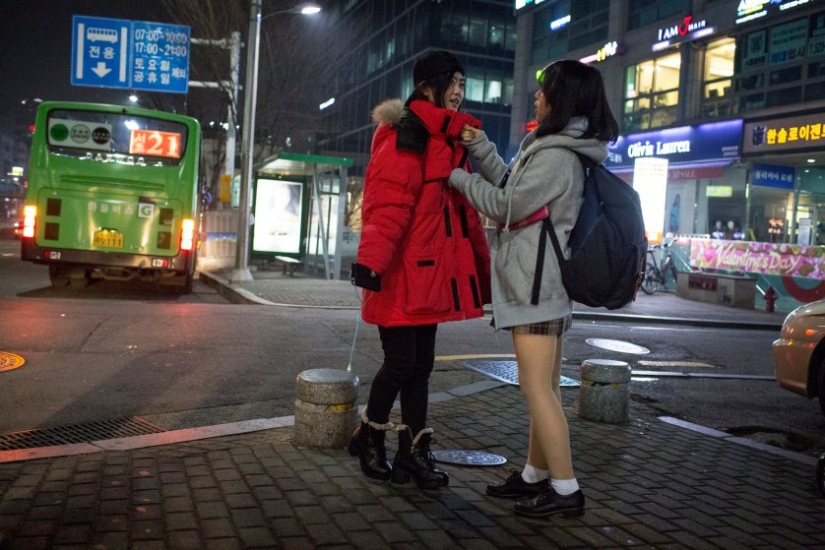
Kyung-ok zips Sarah's jacket, which she took to wear from her brother. The community of North Korean refugees in Seoul is becoming closer and more cohesive thanks to social networks and human rights groups.
Keywords: Refugees | Girls | North korea | South korea
Post News ArticleRecent articles

It's high time to admit that this whole hipster idea has gone too far. The concept has become so popular that even restaurants have ...

There is a perception that people only use 10% of their brain potential. But the heroes of our review, apparently, found a way to ...
Related articles

Tired after a hard day at work? Suffer from autumn depression? Don't know how to entertain yourself in your free time? This ...

Soon the New year, which means it's time to review Christmas movies, buying gifts, planning the celebration and decorate their ...

A series of works by photographer Brian VILS from new York, dedicated to girls, sheltered the homeless and abandoned cats. 'brien ...

New Year's is a time to surprise and delight loved ones not only with gifts but also with a unique presentation of the holiday ...